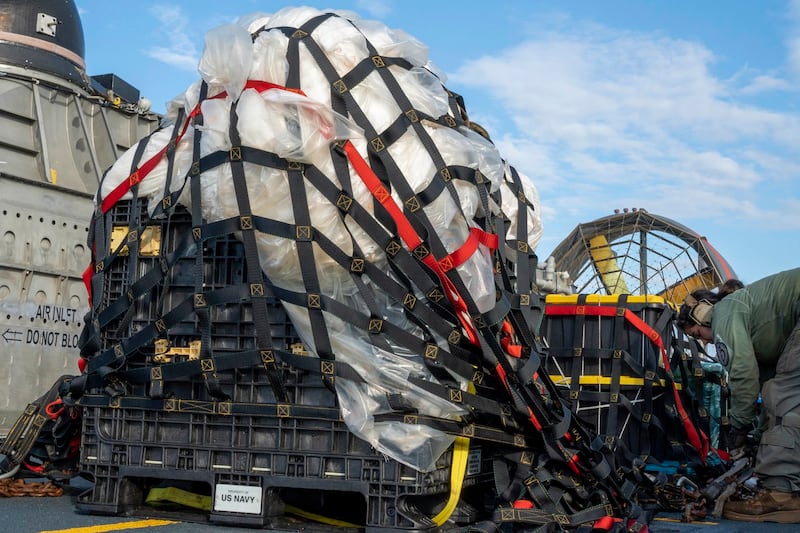China and the U.S. continued to trade accusations over the suspected spy balloon shot down off the South Carolina coast earlier this month as the two countries’ top diplomats met.
Secretary of State Antony Blinken and China''s top foreign policy adviser Wang Yi held a meeting on the sidelines of the Munich Security Conference on Saturday.
This was the most senior-level meeting between U.S. and Chinese officials since the balloon incident. Beijing refused an earlier request for a telephone call between U.S. Defense Secretary Lloyd Austin and Chinese Defense Minister Wei Fenghe.
In a statement released after the meeting, the State Department said Blinken "directly spoke to the unacceptable violation of U.S. sovereignty and international law by the PRC high-altitude surveillance balloon in U.S. territorial airspace, underscoring that this irresponsible act must never again occur."
The People’s Republic of China (PRC) is China’s official name.
“The Secretary made clear the United States will not stand for any violation of our sovereignty, and that the PRC’s high altitude surveillance balloon program – which has intruded into the air space of over 40 countries across 5 continents – has been exposed to the world,” the statement said.
The U.S. military shot down the suspected surveillance balloon on Feb. 4 after observing it for a couple days as it floated over the continental United States.
The incident led to Blinken canceling his planned trip to Beijing despite China insisting that it was a weather balloon that was blown off course.

As U.S.-China relations sour even further, Washington said it “will compete and will unapologetically stand up for our values and interests, but that we do not want conflict with the PRC and are not looking for a new Cold War.”
“The Secretary underscored the importance of maintaining diplomatic dialogue and open lines of communication at all times,” the State Department’s statement said.
‘No apology’
Blinken told U.S. media that the Chinese minister offered "no apology" during the meeting but it was "an opportunity to speak very clearly and very directly" about the matter.
The Chinese foreign ministry in its own readout of the meeting emphasized that this was "an informal contact" at the U.S. side's request.
Wang Yi “pointed out that what the U.S. side has done was apparently an abuse of the use of force and violation of customary international practice and the International Civil Aviation Covenant,” the Chinese statement said.
“It is the U.S. who is in fact the number one country in terms of surveillance, whose high-altitude balloons illegally flew over China multiple times. The US is in no position to smear China,” it said.
Beijing also warned that if Washington “continues to fuss over, dramatize and escalate the unintended and isolated incident, it should not expect the Chinese side to flinch” but should be prepared to bear all the consequences.
U.S. ‘top spying nation’
China also hit back at the U.S. claims that Chinese surveillance balloons have intruded into the air space of more than 40 countries, saying it was the U.S. military that frequently conducted close-in reconnaissance on China, including the use of balloons.
This makes the U.S. “the top spying country in the world,” it said.
The Chinese Communist Party's mouthpiece, People's Daily, published an "exclusive report" by its affiliate Global Times claiming U.S. spy planes conducted over 600 close-in reconnaissance operations in the South China Sea in 2022.
Data provided by Chinese technology and intelligence company MizarVision showed similar sorties also took place in the East China Sea, including in August when U.S. House Speaker Nancy Pelosi visited Taiwan.
The EP-3E, P-8A, RC-135, E-8C and U-2 are the most commonly deployed U.S. reconnaissance aircraft, the report said, adding that spy balloons were also used by the U.S. military, including in an exercise with the Philippines in the Bashi Channel from March to April 2022.
“Made of polyethylene plastic, the balloon can be used for communications, navigation and remote sensing for more than 45 days at a time,” it claimed.
The report accused the U.S. of “conducting real military reconnaissance on China using technologies including balloons” but failed to make any distinction between such balloons and the Chinese “scientific” ones.
The U.S. chief of space operations, Gen. Bradley Chance Saltzman, on Saturday said China, along with Russia, are the most challenging threats that "fundamentally changed" space.
Gen. Saltzman was speaking on the sidelines of the Munich Security Conference.
He told reporters that “space as a contested domain has fundamentally changed… mostly because of the weapons [China] and Russia have tested and in some cases operationalized.”
The Chinese foreign ministry has said that space is a global public sphere and the U.S. should stop fueling its militarization and weaponization.
